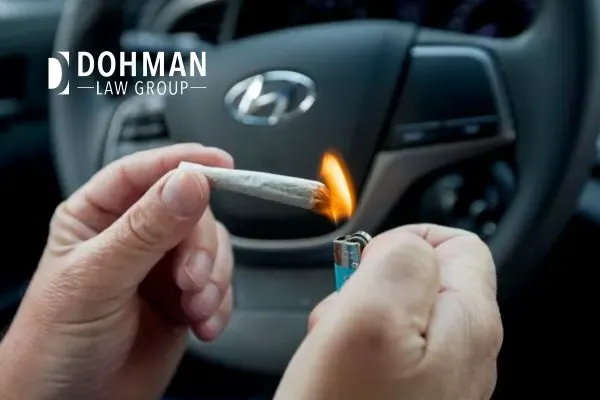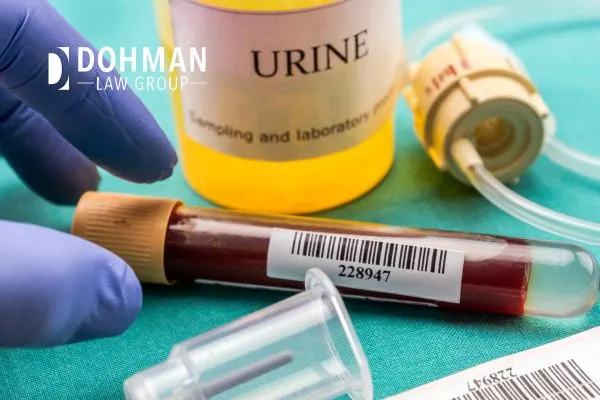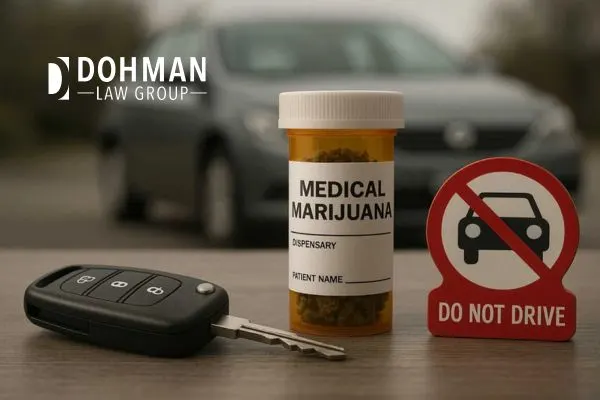Caught driving high in Illinois? A DUI charge can turn your world upside down. While recreational cannabis is now legal, driving while impaired is still a serious crime. The laws are complex, and the consequences can be severe.
It’s crucial to understand your rights and the legal process you’ll face. If you’ve been charged with a marijuana DUI, don’t wait. Getting a DUI Defense Attorney on your side is the most important step you can take.
Call Dohman Law at (847) 616-9993 for a case evaluation and to learn about your options.
Understanding Illinois Cannabis DUI Laws
Illinois law prohibits driving under the influence of drugs, like marijuana, if it impairs safe driving. The state can charge you with a Cannabis DUI in two main ways:

- Impaired Driving: This is a subjective charge based on a police officer’s observations of your driving and behavior. If the officer believes your ability to drive is compromised by cannabis use, they can charge you with a DUI.
- Per Se Law: Illinois law prohibits driving with THC levels of 5 nanograms or more in blood or 10 nanograms in other bodily substances, such as urine, within two hours of driving, regardless of perceived impairment.
Comparisons with Alcohol DUI Regulations
Marijuana DUI laws differ from alcohol. Unlike the clear 0.08% BAC limit, THC lingers in the body long after impairment fades. This means you could test over the legal limit even if you weren’t actually impaired, a major challenge, especially for medical marijuana users.
Implied Consent and Testing
In Illinois and most other states, you have a driver’s license because of something called the Implied Consent Law. This law means that by having an Illinois driver’s license, you automatically agree to submit to chemical testing if you are arrested for a DUI.
Breathalyzer and Blood/Urine Test Requirements
Unlike an alcohol DUI, there is no roadside Breathalyzer for marijuana. Instead, law enforcement officers will ask you to perform field sobriety tests and, if they suspect impairment, they will ask for a blood or urine sample for chemical testing.
- Blood Test: A blood test is often considered the most accurate way to measure THC concentration at a specific time. A blood or urine sample will be taken at a hospital or police station.
- Urine Test: A urine test can also be used, but it’s often not as accurate for showing recent use because THC can be found in urine for a long time after consumption.
Consequences of Refusal
Refusing a chemical test might seem like a good idea, but it can make things worse. Under the Implied Consent Law, if you refuse to take a test, you will automatically face a Statutory Summary Suspension of your driver’s license by the Illinois Secretary of State.
- First-time refusal: Your license will be suspended for 12 months.
- Second or subsequent refusal within five years: Your license will be suspended for 36 months.
This license suspension is separate from any criminal penalties you might face, and it goes into effect 46 days after your arrest, regardless of the outcome of your criminal case.

Legal Consequences of a Marijuana DUI
A marijuana DUI charge is a serious matter with lasting consequences. The penalties can impact your finances, your freedom, and your ability to drive.
Criminal Penalties Overview
A first-time Cannabis DUI is typically a Class A Misdemeanor in Illinois. The potential penalties include:
- Up to one year in jail.
- Fines of up to $2,500.
- Mandatory drug education and counseling.
- Community service.
- A criminal record that can affect your job and future.
If a DUI involves aggravating factors such as driving with a child under 16 in the car or causing an accident that results in injuries, the offense may be elevated to a felony, carrying harsher penalties, including potential prison time.
Learn More: What Not to Say During a DUI Stop
Driver’s License Revocation Details
Beyond the Statutory Summary Suspension, a conviction for a DUI will also lead to the revocation of your Illinois driver’s license.
- First offense: Your license will be revoked for a minimum of one year.
- Second offense: Your license will be revoked for five years.
- Third offense: Your license will be revoked for ten years.
To get your driving privileges back, you will have to go through a hearing with the Illinois Secretary of State and may be required to get a Breath Alcohol Ignition Interlock Device (BAIID), even for a marijuana DUI.
Impact on Registered Medical Marijuana Users
Illinois’s Compassionate Use of Medical Cannabis Pilot Program Act permits the legal use of medical marijuana, but a card is not a free pass to drive impaired. If an officer determines you were operating a vehicle unsafely, you can still face DUI charges.

Challenges in Determining THC Impairment
One of the biggest problems with marijuana DUI laws is that it’s difficult to determine impairment accurately.
Reliability of Field Sobriety Tests
Police often use tests like the horizontal gaze nystagmus, walk-and-turn, and one-leg stand to gauge impairment. While effective for alcohol DUIs, even the NHTSA admits they’re far less reliable for detecting drug use.
Measurement Difficulties and Legal Hurdles
THC lingers in the body for days or weeks, so a blood or urine test may show a positive result long after actual impairment has passed. This makes it harder for prosecutors to prove impaired driving and gives DUI attorneys strong grounds for defense.
Defensive Strategies and Legal Representation
When you’re facing a marijuana DUI, having a strong DUI defense strategy is essential. A well-prepared defense can protect your rights, challenge the evidence against you, and improve your chances of a favorable outcome.
Importance of Legal Counsel
A criminal defense attorney who understands Illinois law can be a game-changer. They can challenge the evidence against you, question the legality of the traffic stop, and fight to get a better outcome for your case, whether you’re in DuPage County, Cook County, or Lake County.
Defensive Approaches in Court
A defense attorney can use several strategies, such as:
- Challenging the accuracy of the chemical testing and the chain of custody for your sample.
- Arguing against the officer’s observations during the field sobriety tests.
- Proving that a positive THC test was due to past use, not current impairment.
- Filing a petition to rescind your statutory summary suspension.
Learn more: Common Mistakes Police Make During DUI Stops
Navigating a DUI Stop
If you’re ever stopped by law enforcement, remember these steps:
- Be Polite and Calm: Don’t argue with the officer.
- Provide Your Documents: Give them your driver’s license, registration, and proof of insurance.
- Stay Silent: You are not required to answer questions about whether you have been using marijuana or alcohol. Anything you say can be used against you.
- Be Mindful of Tests: You have the right to refuse field sobriety tests and a roadside chemical test, though refusing the latter will result in a license suspension.

Post-Cannabis Legalization Context
The legalization of the recreational use of marijuana in Illinois has changed the legal landscape. While the new laws brought about by the Illinois Cannabis Laws have created new rules for legal use, they haven’t changed the fundamental principle that you cannot drive while impaired.
Changes in the Legal Landscape
The new laws mean that law enforcement is now focusing more on drugged driving, and a strong defense attorney is needed more than ever. The legal system is still figuring out the best ways to handle these cases, and the laws are always evolving.
Learn more: 8 Questions to Ask a DUI Lawyer
Don’t Face Cannabis DUI Charges Alone
A marijuana DUI in Illinois carries serious consequences, from license suspension to jail time. The state aggressively enforces impaired driving laws, and with THC testing still evolving, building a strong defense is crucial. Whether you’re a medical or recreational user, you need an attorney who understands cannabis DUI law and will fight for your rights. If you’re facing charges, don’t go through it alone.
The Illinois marijuana DUI attorneys at Dohman Law are ready to help. Contact us today for a free consultation to discuss your options and build a strong defense.


